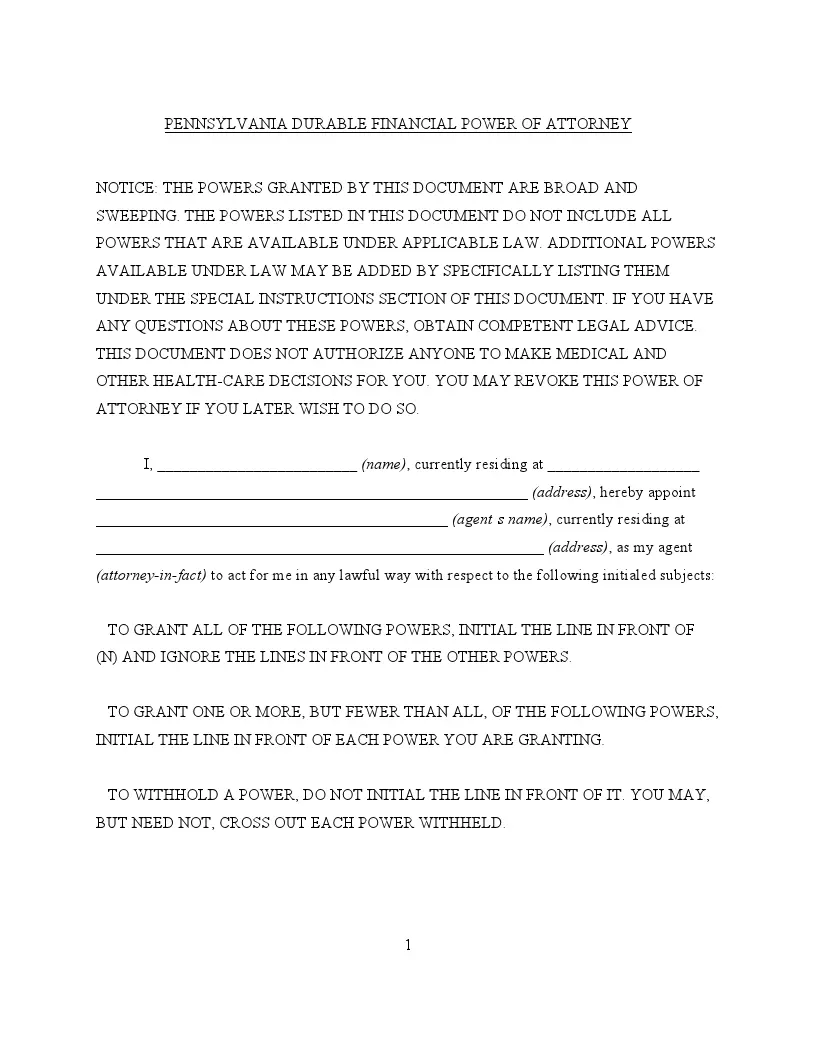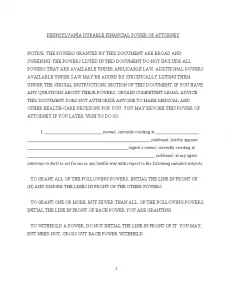Free Pennsylvania Durable Power of Attorney Form
In the US, a “Durable Power of Attorney” (or DPA) form exists for special cases where a person suddenly is not capable of acting regarding his or her finances and properties. Among these cases are a severe illness or accident with the result of a coma or any other medical state that makes a person unavailable to carry out several actions.
Though we have mentioned medical conditions, you should know that the durable power of attorney form is tied to financial matters only. Appointing someone responsible for your medical care in severe physical conditions requires completing another form.
Pennsylvania power of attorney templates – find out more about powers of attorney that can be used for different things in Pennsylvania.

Build Your Document
Answer a few simple questions to make your document in minutes
Save and Print
Save progress and finish on any device, download and print anytime
Sign and Use
Your valid, lawyer-approved document is ready
So, the DPA form allows you to choose someone that you can rely on even if you are unconscious. Why is the form “durable”? Once you sign it, the document will be effective until you either revoke it or die.
The DPA form is the easiest and legal way to choose a person you can trust who will act on your behalf. Your attorney may be either your relative (or one of your closest people) or a professional agent you will hire specifically for this. It is only your choice to make, and you may designate your spouse or anyone else as your attorney.
All of the signatories that participate in completing the DPA form should be in good conscience. Typically, every US state considers the DPA form valid if it is notarized. In several US states, you may need to ask a witness to sign.
Pennsylvania Signing Requires and Laws
The full information about the DPA form, its description, and rules that one should use to complete the document in Pennsylvania are stated in chapter 56 of state law. As it is said in section 5601, the DPA form in Pennsylvania must be verified by a notary and signed by two witnesses. The form itself is brief and contains six pages.
By completing the DPA form in Pennsylvania, as a principal, you might delegate several financial matters to your agent(s) or attorney(s), including:
- Insurance transactions
- Family and personal maintenance
- Retirement plan operations
- Estate transactions
And many other matters that are tied to your properties and money.
Choosing the operations that you are ready to delegate usually takes a while. We recommend thinking thoroughly and choosing wisely among all the matters before creating and signing the DPA form. Remember that your assigned agent (or attorney) will carry out all the chosen transactions and operations, so this person should be either a professional or someone you fully trust.
It is recommended to have at least three copies of the DPA form. Do not skip the point of notarizing the form: in Pennsylvania, it will be required.
Pennsylvania Durable Power of Attorney Form Details
| Document Name | Pennsylvania Durable Power of Attorney Form |
| Other Names | Pennsylvania Financial Durable Power of Attorney, PA DPOA |
| Relevant Laws | Pennsylvania Consolidated Statutes, Title 20, Chapter 56 |
| Signing Requirements | Notary Public and Two Witnesses |
| Avg. Time to Fill Out | 10 minutes |
| # of Fillable Fields | 37 |
| Available Formats | Adobe PDF |
Popular Local Durable POA Forms
Durable POA forms allow you to designate a proxy who will be able to take care of your financial affairs even when you end up unable to make decisions yourself. These are the states DPOA forms are used in most frequently.
Steps to Complete the Form
For your information, we have prepared a detailed guide that provides you with all the steps you need to create the DPA form successfully in Pennsylvania. You may check out the instructions below.
1. Download the Pennsylvania DPA Form Template
To start creating the DPA, you will need its template. You may use our form building software to get the form on your device in the simplest way.
2. Read the Notice Carefully
As in many US states, the DPA form in Pennsylvania starts with a notice that contains general information about this document. If you are the principal, read the notice thoroughly to understand the key details and purposes of the form. In case of misunderstanding, contact your lawyer for clarification.
3. Add Your Name and Sign
As a principal, you have to confirm that you have read and clearly understood the notice. So, you will see the lines below to do so. Add your signature first, then your printed name, and a date when you are signing this form.

4. Add Your Address and Name Again
The second page of the DPA form in Pennsylvania starts with a principal’s statement. Here, he or she should add the name and full address.

5. Assign Your Agent or Attorney
Below the principal’s details, you will see the blank lines where you have to insert the full name and address of your agent (or attorney).

6. Opt for the Financial Matters
In the following section, you have to choose which financial matters to delegate. In the DPA form in Pennsylvania, the list of responsibilities consists of:
- Commodity and option operations
- Operations related to the business
- Banking transactions (or any other financial institution operations)
- Claims and litigation
- Estate, trust, other beneficiary operations
- Governmental benefits (like military service perks, Medicare, and others)
- Tangible property operations
- Real estate operations
- Retirement plan operations
- Personal and family maintenance
- Taxes
- Insurance and annuity operations
- Stock and bond operations
To make it easier for the principal, every point of the list has a brief description. If you want to include any of them in the list of your agent’s responsibilities, place your initials on the left-hand side in a relevant blank field. You also may choose all of the matters by placing your initials to the point “N.”

7. Leave Special Instructions
Below the list of financial matters that are regulated by this form, you can see blank lines. If you need to leave some special instructions to your agent or attorney, place them in those lines. With the instructions, you may either limit or extend the abilities of your agent.

8. Read the Following Text
Further, you should read a couple of statements that are presented in the DPA form, understand, and agree with them.
9. Designate Your Successor Agent
A successor agent is a person who will replace your initial agent in case your initial agent has faced trouble and has become unavailable or died. In Pennsylvania, you may add several successor agents to your DPA form. They will act in the same order as you place them in the document.

10. Sign the DPA Form
Now, you have to place the date of signing and your signature on the DPA form. Also, insert your printed name under the signature.

11. Ask a Notary to Sign
According to Pennsylvania state law, give the signed DPA form to a notary that has to sign it as well.

12. Ask Witnesses to Sign
As we have mentioned above, in Pennsylvania, two witnesses have to sign the DPA form apart from a notary. Both of them should read the statement and accept it by providing their full names, addresses, and signatures.

13. Ask Your Agent to Acknowledge and Sign
At the end of the DPA form, your agent (or attorney) has to read the notice, accept it, and insert his or her name. Besides the full name in the statement, a printed name, signature, and date of signing are required.


We provide an array of fillable Pennsylvania forms to anybody striving for ease when dealing with various agreements, contracts, and other paperwork.
Download a Free Pennsylvania Durable Power of Attorney Form
